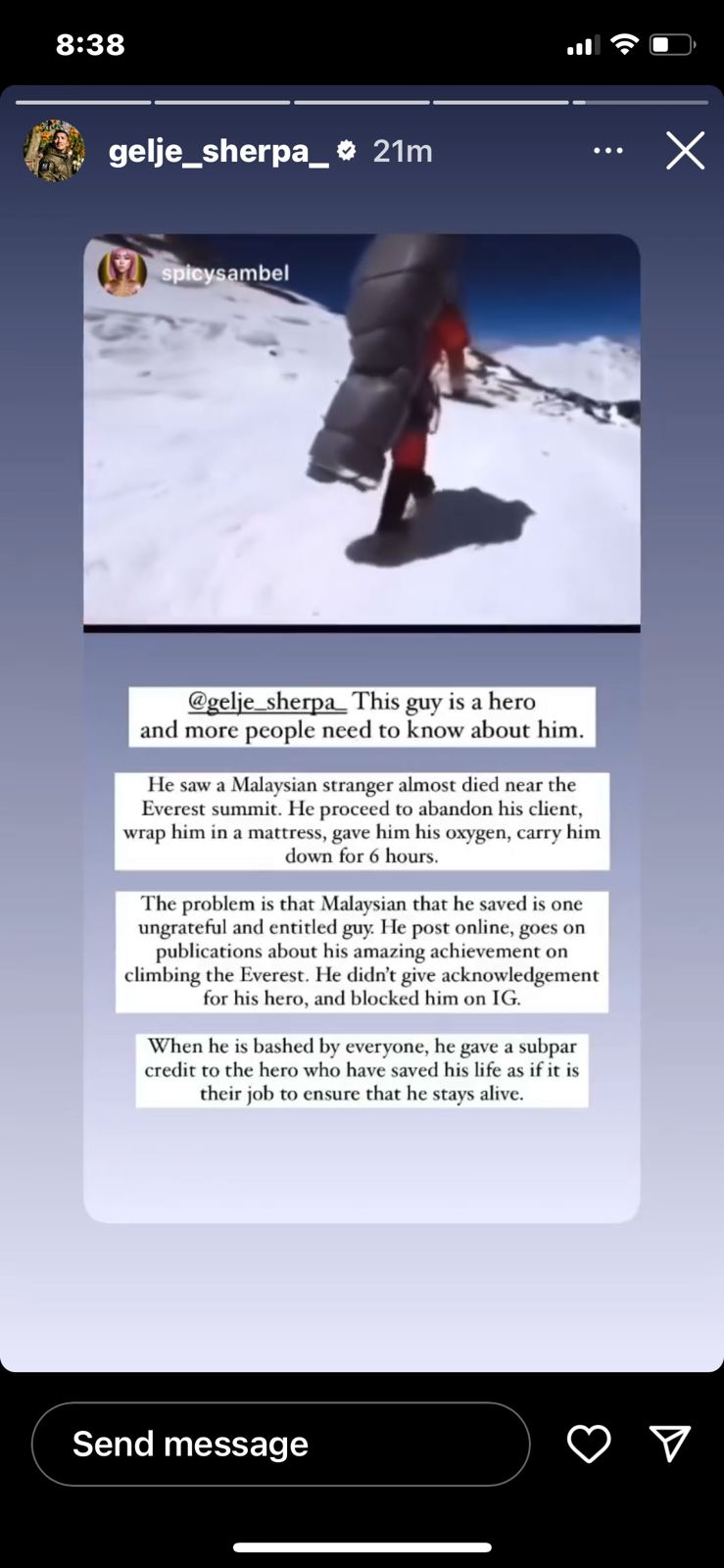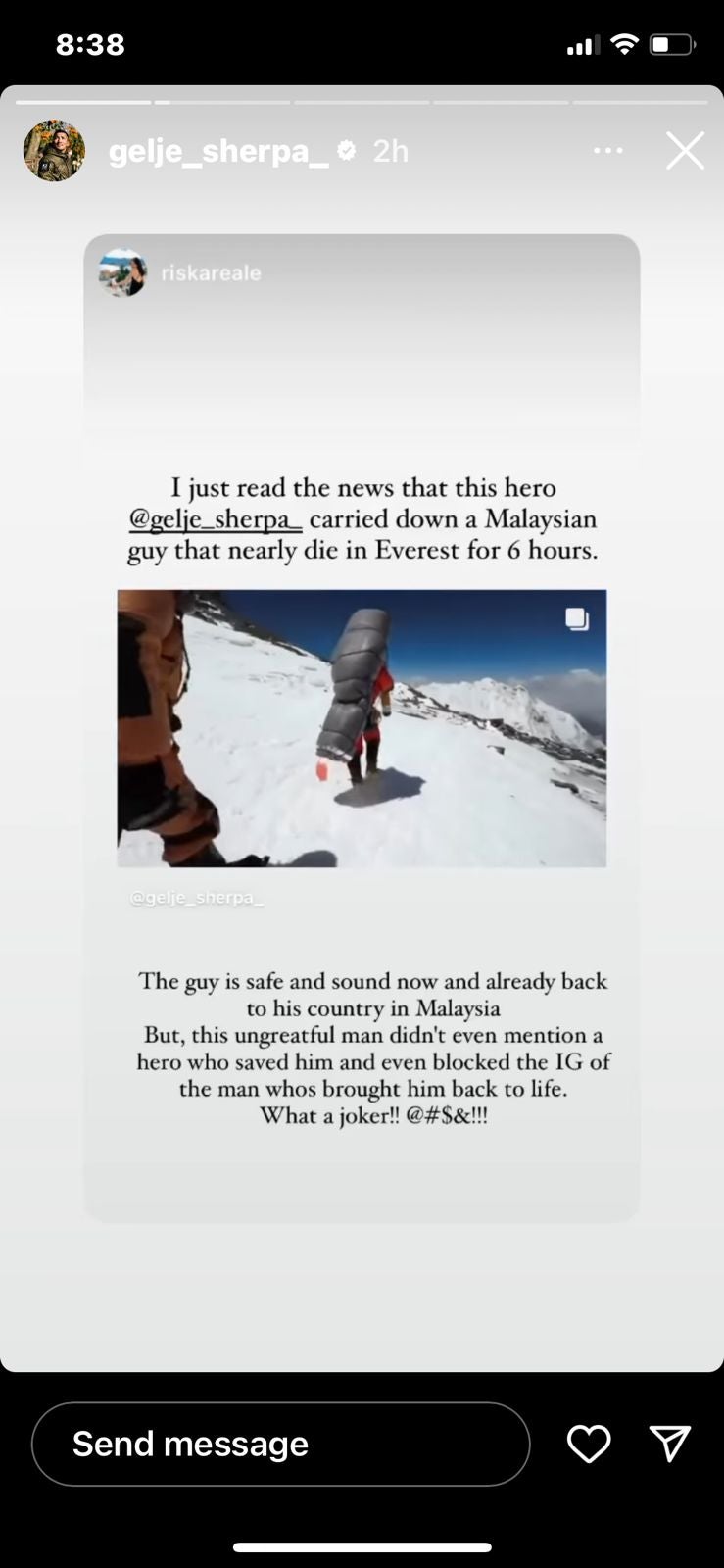How the tale of a sherpa’s ‘near impossible’ Everest rescue descended into social media mudslinging
Malaysian climber faces heat for not showing enough gratitude to Nepalese sherpa who carried him down on his back from Everest’s ‘death zone’, Maroosha Muzaffar reports

Your support helps us to tell the story
From reproductive rights to climate change to Big Tech, The Independent is on the ground when the story is developing. Whether it's investigating the financials of Elon Musk's pro-Trump PAC or producing our latest documentary, 'The A Word', which shines a light on the American women fighting for reproductive rights, we know how important it is to parse out the facts from the messaging.
At such a critical moment in US history, we need reporters on the ground. Your donation allows us to keep sending journalists to speak to both sides of the story.
The Independent is trusted by Americans across the entire political spectrum. And unlike many other quality news outlets, we choose not to lock Americans out of our reporting and analysis with paywalls. We believe quality journalism should be available to everyone, paid for by those who can afford it.
Your support makes all the difference.It started as a heart-warming tale of a sherpa who abandoned his own client’s Everest summit attempt to rescue a climber from certain death on the world’s tallest mountain.
Within days of his rescue, the climber appeared on several TV channels talking about his life-changing experience but curiously failing to mention the name of his heroic “saviour” – an act that did not go unnoticed by the mountaineering community breathlessly following the story.
It escalated further when the Malaysian climber – identified as Ravichandran Tharumalingam or T Ravichandran – appeared to block Gelje Sherpa on social media, astounding several people in the community who are now accusing him of erasing the sherpa’s act of courage.
How it all started
On 18 May, Gelje Sherpa was guiding a client up Mount Everest when he says he spotted Ravichandran stranded in Everest’s “death zone”. The 36-year-old sherpa says in an Instagram post that he saw the climber shaking and clinging to a rope, “a man who needed rescuing and no one else was helping”.
Gelje, who calls himself a “mountain tiger” and a “fighter”, says he convinced his Chinese client to cancel their own expedition so he could help the Malaysian climber down to safety. He carried him on his back down from the “death zone”, the highest part of Everest at an altitude above 26,247ft (8,000m) where atmospheric oxygen is so low that cells in the human body die in the absence of any supplementary oxygen.
On his Instagram account, the sherpa wrote that the climber would have “died up there alone” without his help, adding: “I carried him myself all the way down.”
The Nepalese authorities have led the mountaineering community in hailing Gelje’s “very rare” death zone rescue mission. “It is almost impossible to rescue climbers at that altitude,” Bigyan Koirala, an official from the Nepal department of tourism, told the Guardian of Gelje’s heroic actions. “It is a very rare operation.”
Yet bizarrely there is one person who appears not so impressed with Gelje’s feat – Ravichandran himself. The climber, who goes by the handle @ravieverest on Instagram, has received a backlash online amid suggestions that he failed to sufficiently credit Gelje for saving his life, and instead blocked him on Instagram.
Ravichandran was put on a flight back to Malaysia after the rescue operation.
He appeared on TV channels talking about his Everest experience and thanked the expedition partner company – but didn’t mention Gelje’s name there either.
Netizens soon pointed out the alleged erasure and panned him for what they described as a lack of gratitude for the man who carried him to safety.
‘I was so desperate to prove a point’
When commentators began asking Ravichandran about Gelje’s role in his rescue, he appears to have blocked the sherpa on Instagram.
Some said Ravichandran had also deleted references to the sherpa in the comments on his posts.
This coming from the 58-year-old Malaysian, who is a veteran mountaineer himself, shocked many. Ravichandran lost eight fingers to frostbite during his Everest expedition in 2007. He told Channel News Asia last year after his third summit and first after his disfiguration: “I was so desperate to prove a point, I was pushing myself too much that I ignored the pain in my fingers.” He said he wanted to “conquer old demons”.
“Every time you go back to places that make you feel dark in your thoughts, and (you) overcome the challenges better, it gives you a brighter space and brighter view,” he said.
In one Instagram post after last month’s everest rescue, Ravichandran wrote: “I am alive today because I had the best and dedicated Partners – The 14th Peaks Expedition Co and Global Rescue Inc.”
This narrative contrasts with what Gelje maintained from the start. “No one was helping him, no friends, no oxygen, no sherpas with him, no guides – so this is quite dangerous for him,” he told CNN.
“You are alive today because a sherpa and his friend took you down to safety and it was documented for everyone to see. Acknowledge that,” commented Instagram user @tristupe on the climber’s post.
@tristupe later claimed “he [@ravieverest] has been deleting comments not suiting the narrative.”
Users also speculated about why the climber did not acknowledge Gelje.
“I can’t even wrap my head around why?” asked Twitter user @solarsystern.
“Why would you thank the expedition company you climbed with but not the individual that saved your life?”
In his Instagram post about the rescue, Gelje, earlier in May, noted: “Saving one life is more important than praying at the monastery.” He told the media that the rescue on 18 May was “massively difficult”.
Gelje, who grew up near Everest in a small village, started out as a porter, which he says is “a relentless job with small pay”. He has also worked as a Khumbu icefall “doctor” – “possibly the most dangerous job known to man” – and has carried out more than 55 rescues till date. But he said the 18 May rescue of the Malaysian climber was the “hardest in my life”.
Gelje shares criticism of Ravichandran
The bizarre Everest saga took a turn on Sunday when Ravichandran, seemingly facing pressure from the mountaineering community for his social media activity, reportedly unblocked Gelje.
“He has acknowledged and unblocked @Geljesherpa19 finally,” tweeted @tristupe.
In an unusually lengthy Instagram post, Ravichandran finally acknowledged Gelje – while also maintaining in the comments that he had thanked the sherpa two weeks ago.

“Sherpas are people who are so committed and dedicated to their clients especially coming from 14 Peaks Expedition Co & The Seven Summit Expedition Co. They never leave you behind.
“I experienced it this year. When descending the summit I had difficulty. Tashi heard that I am in trouble, he organised the rescue team (Mingma Tendi, Gelje Sherpa, Nima Dorchi, Nima Tashi, Dawa and Dipen Bhote). They are high-altitude sherpas who make lots of sacrifices for their clients. They brought me to 7300 metres for Heli pick-up for a quick Heli flight to the hospital,” Ravichandran continued.
“Sherpas are important in my 8000-meter expeditions.”
“Thank you [prayer emoji]. I hope you are recovering well,” responded Gelje in the comments.
Gelje was applauded on social media for the “tremendous grace” of his response.
Other commentators apologised to Gelje. “Thank you for your kindness, we are truly sorry for his ignorant attitude,” said one comment.
Observers pointed out the discrepancy between Ravichandran’s post and Gelje’s accounts to the media.
“Funny how this ‘thank you’ post doesn’t mention the words thank you and the story doesn’t really add up to Gelje’s version of events either. But hey guess it’s something,” read one comment.
Then on Monday morning, Gelje started resharing stories critical of Ravichandran.

An Instagram story that Gelje reshared read: “When he [Ravichandran] is bashed by everyone he gave a subpar credit to the hero who have [sic] saved his life as if it is their job to ensure that he stays alive.”
Gelje also shared a story by a user who called Ravichandran an “ungrateful bum” on his Instagram stories.
While the mudslinging continues online, Gelje has now left Nepal for Alaska where he is attempting to scale Mount Denali aka McKinley – the highest peak in North America.
The Independent has reached out to Ravichandran, Gelje and Tashi Sherpa of 14 Peaks Expedition Co for their comments on the saga.





Join our commenting forum
Join thought-provoking conversations, follow other Independent readers and see their replies
Comments